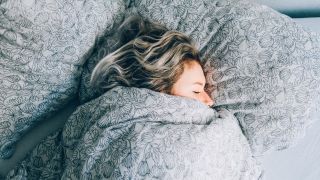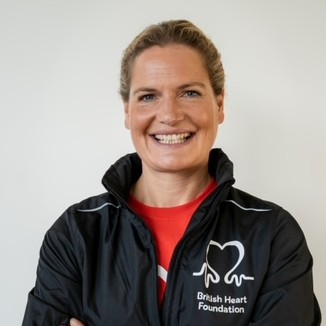How Much Does Sleep Affect Athletic Performance?
Making sure you’re getting enough sleep should be a part of any serious training plan

There are a lot of glamorous ways to try to enhance your athletic performance, from carbon plate running shoes that help you run more efficiently to massage guns and compression boots that help you recover faster. However, whatever sport you do, the key to long-term success comes down to training consistently, eating well and sleeping enough.
Of those elements, sleep is the one that we tend to gloss over. We’ll smash out intense workouts and eat more protein than any human could possibly need, but committing to a consistent bed and wake time? Absolutely not.
Life can get in the way of sleep, of course, but once you learn about the benefits of sleep for performance, it’s clear that it’s something you need to prioritise where possible. We spoke to sleep scientist Dr Sophie Bostock about the importance of sleep to performance. Bostock is a member of the British Heart Foundation London Marathon support squad, a team of experts supporting the charity’s runners at the 2022 marathon.

Dr Sophie Bostock received a Bachelor of Medical Sciences in medicine from Nottingham University and stayed on at the institution to earn an MSc in entrepreneurship. She has also completed a PhD in health psychology at University College London. Sophie has also held the title of honorary research associate at the Sleep & Circadian Neuroscience Institute at the University of Oxford, collaborating on various research projects. Sophie is also a member of the American Academy of Sleep Medicine and the British Sleep Society. She is the founder of TheSleepScientist.com, which consults with employers, professional sports teams and healthcare providers to help people understand the science of sleep and how to use it to their benefit.
Why is sleep so important to performance?
When you look across the research, pretty much every aspect of physical, emotional and cognitive performance is influenced by sleep loss. It’s particularly sub-maximal strength and endurance that are affected in the athletic performance space, but also decision-making. There are a lot of ways that sleep disruption can impact on your performance, particularly in a long race.
Have studies quantified the effect of a lack of sleep on performance?
There was a study which looked at a 30-minute self-paced treadmill test after 30 hours without sleep, so that’s just one night without sleep. People covered typically 3% shorter distance but with a similar perceived effort. There was another study that looked at a 50-minute sprint protocol that showed a slower sprint speed and lower muscle glycogen concentration.
There was a review this year – a systematic review that pulled together lots of different studies – which looked across different aspects of physical performance. It suggested that the negative impact on exercise performance across these different metrics was around 7-7.5%. This was for total sleep deprivation, and the effects got worse the longer the sleep was deprived. There were also more consistent effects in the afternoon versus the morning, which is interesting, because the time since sleep deprivation makes a difference.
There are caveats to this: 7-7.5% sounds huge, but that was total sleep deprivation. And it was probably mostly in a lab. I think it’s also really important not to overstate the effects, because we can really make people anxious about not getting enough sleep. For the most part, one night with dodgy sleep is probably not going to make too much difference, but multiple nights over multiple weeks – that’s the kind of thing that impacts performance.
Get the Coach Newsletter
Sign up for workout ideas, training advice, reviews of the latest gear and more.
How much sleep do you need?
Seven to nine hours is usually recommended for an average adult, but if you’re an athlete doing loads of training you probably need a little bit more, so your recommendation would be on the higher end of your seven to nine hours average. And if you’re fortunate enough to be in your early 20s or late teens, it’s probably more like eight to 10 hours.
Is it true that sleeping more before midnight is more beneficial than sleeping longer in the morning?
In some ways it’s an old old wives’ tale, but there really is a difference in the nature of sleep that you get depending on where it is in the 24-hour cycle. The nature of sleep is controlled by the circadian rhythms, this 24-hour rhythm which is drilled into us, and it’s regulated very much by light.
When you go to sleep in the first part of the night, you tend to get more deep sleep, slow-wave sleep, which is often associated with physical energy and muscle repair, growth hormone, that sort of thing. Whereas in the second part of the night, we get more REM sleep. Rapid eye movement sleep is very important for creativity and memory, regulating our emotions also.
So there is no such thing as unhelpful sleep, but there is some truth in the benefits of not pushing your bedtime back too late.
Do you recommend napping to extend your overall sleep time?
I am a big proponent of the power nap, particularly for those people who are having disrupted sleep at night, whether they’re parents or because of work. Sleep extension could include a few extra naps, particularly between one and 4pm, in that lull after lunch – even if you only have 20 minutes. Some studies have even found a nap of 10 minutes can be enough to improve your mood and alertness. A short nap like that is not going to interfere with your sleep at night.
So as an alternative to just guzzling loads of caffeine and sugar, I think a short nap – particularly when you’re training hard – is good. Most of the athletes I’ve worked with will nap if they’ve got a long training session in the morning and a long training session in the afternoon.
But don’t worry if you’re not a napper – some people just aren’t. It’s still good just to have a break, but if you feel really sleepy, I would always recommend a nap versus more caffeine.
Do you recommend using a sleep tracker?
I have a bit of a love/hate relationship with trackers. I think they are brilliant for encouraging a little bit of accountability. The time you really benefit from them is when you’re looking for consistency in your sleep. A consistent wake time is probably one of the most important elements for getting your circadian rhythms on track. And they do give you a bit of an indicator of whether you’re skimping on your time asleep or not.
But the most important metric for the quality and quantity of your sleep is really how you feel during the day, because we’re all different, and we all need slightly different amounts of sleep. I would encourage people not to compare themselves with others, but to really think about how they’re feeling. So if they are finding that they are reliant on caffeine or lots of sugary snacks throughout the day just to keep themselves awake, that’s a pretty good clue that they’re not getting enough sleep and it doesn’t matter what that tracker says.
An over-reliance on that tracker can lead to quite an unhealthy obsession with the perfect night’s sleep. Very often I meet people who are suffering from insomnia who will give me some kind of data from the tracker and I usually tell them to take it off as a first intervention. Until you worry a little bit less about what the tracker says, take it off.

Nick Harris-Fry is a journalist who has been covering health and fitness since 2015. Nick is an avid runner, covering 70-110km a week, which gives him ample opportunity to test a wide range of running shoes and running gear. He is also the chief tester for fitness trackers and running watches, treadmills and exercise bikes, and workout headphones.
